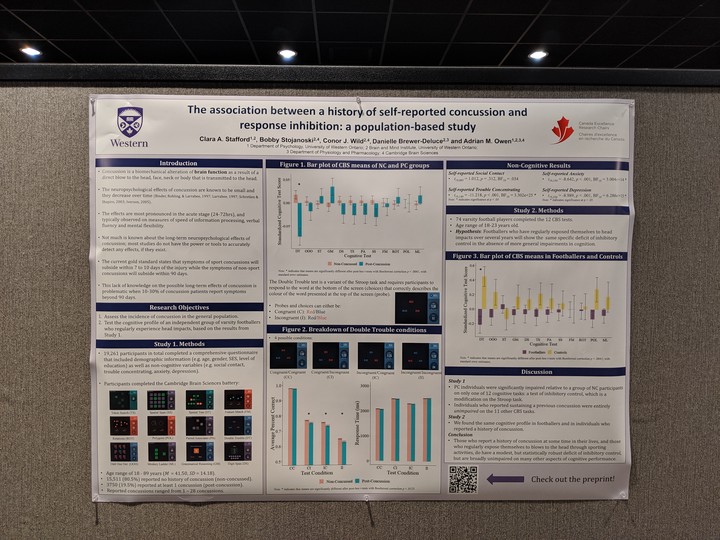The association between a history of self-reported concussion and response inhibition: a population-based study
 Poster AANSCC 2019. Clara Stafford.
Poster AANSCC 2019. Clara Stafford.Abstract
We investigated the long-term cognitive effects of concussion in almost 20,000 members of the general population, using tests that are known to be sensitive to small changes in performance. Concussions are the most common type of mild traumatic brain injury, with clinical symptoms such as headaches, dizziness, and nausea, persisting for months post-injury. Despite a growing understanding of the severity and duration of these symptoms, very little is known about the long-term effects of concussion on higher level cognitive functioning and emotional lability. We asked 19,261 participants to complete a demographic questionnaire as well as the Cambridge Brain Sciences (CBS) cognitive battery. We divided our sample into two groups - those reporting at least one concussion in their lifetime (post-concussion) and those reporting no concussions in their lifetime (non-concussed). We compared the performance of the two groups on the 12 CBS tasks, as well as on four non-cognitive variables measuring levels of social contact, anxiety, depression, and concentration difficulties. We found that post-concussion individuals performed significantly worse on a modified Stroop task that measures aspects of response inhibition, but were no worse on any other cognitive measure, including short-term memory, reasoning, and verbal abilities. Crucially, performance profiles of the post-concussion individuals indicated that they made more errors on trials that involved an incongruent colour/word pair. Beyond measures of cognition, we found that post-concussion participants also reported higher levels of anxiety, depression, and trouble concentrating when compared to the non-concussed group. The number of reported concussions also predicted task scores on this task only. Our results suggest that sustaining a concussion is not associated with long-term global effects on cognition. Those who report at least one concussion appear to have a modest, but statistically significant deficit of response inhibition. This impairment seems to be related to the number of concussions reported.